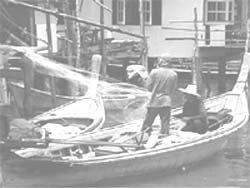THAILAND
 Thailand's position as one of the world's leading seafood exporter may soon be a thing of the past as overfishing has damaged the quality and quantity of catches. Prospects for the maritime industry seem dire, to the extent that there is an urgent need for the government to shift focus from exports to building up the more environment-friendly small-scale fishing industry. The livelihood of the small-scale fisherfolk has suffered drastically after the entry of big commercial operators, who scoop up most of the stock, said Somsak Chulasorn of Thailand's fisheries department.
Thailand's position as one of the world's leading seafood exporter may soon be a thing of the past as overfishing has damaged the quality and quantity of catches. Prospects for the maritime industry seem dire, to the extent that there is an urgent need for the government to shift focus from exports to building up the more environment-friendly small-scale fishing industry. The livelihood of the small-scale fisherfolk has suffered drastically after the entry of big commercial operators, who scoop up most of the stock, said Somsak Chulasorn of Thailand's fisheries department.
"The industry is collapsing because there are no ethics. The problem has been around since 1973, when the catch exceeded the country's production capacity,' he said. He was speaking at a national seminar on "The Direction of Thai Sea Fishing', which brought together more than 300 participants, including academics, cold storage business people and local fishinggroups. The seminar, which followed agriculture minister Pongpol Adireksarn's 16-day visit to the Seychelles to create trade ties on deep-sea fishing, was aimed at ending the conflict over resources between authorities, big and small-scale fisherfolk.
Related Content
- Integrating co-benefits into Nationally Determined Contributions, climate policies and air pollution policies in Asia
- Fossil fuel subsidies and GHG emissions: firm-level empirical evidence from developing Asia
- International labour migration in a changing climate: insights from Malaysia and Thailand
- Thailand’s clean electricity transition: how accelerated deployment of renewables can help achieve Thailand’s climate targets
- Modeling traffic congestion effects on air pollutants
- Gender, health and air pollution
